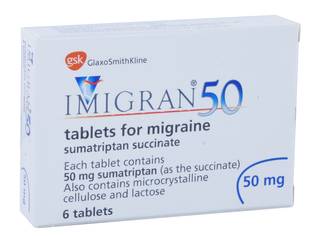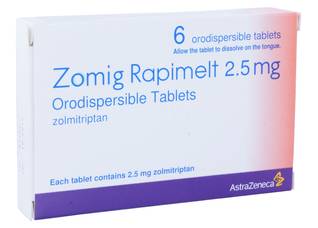Imigran vs Zomig
There is a wide variety of medication available to help treat the condition and it is important to understand the differences before making a decision as to which medication may be better for you...
Updated: Friday 11 June 2021

Migraines are a complex debilitating condition affecting over 80 million people in the UK. There is a wide variety of medication available to help treat the condition and it is important to understand the differences before making a decision as to which medication may be better for you.
The most common group of medications are called 5HT1-receptor agonist (“triptans”), most commonly prescribed as sumatriptan (brand name, Imigran) or zolmitriptan (brand name, Zomig). This group of medications work by acting on the 5HT (serotonin) 1B/1D receptors that reverse the temporary widening of the blood vessels in the brain. This alleviates the pain and other symptoms associated with migraine attacks including nausea and sensitivity to light. Choice of medication between the different triptans depends on the severity and regularity of your migraines.
| |
Imigran (Sumatriptan) |
Zomig (Zolmitriptan) |
| |
 |
 |
| Active Ingredient |
Sumatriptan |
Zolmitriptan |
| Form |
Tablets, nasal spray |
Tablets, oro-dispersible tablets, nasal spray |
| Strength |
50mg and 100mg tablets
20mg nasal spray
|
2.5mg and 5mg
5mg nasal spray |
| Directions |
Tablets: 50mg (some patients may require 100mg); dose may be repeated after at least 2 hours if migraine recurs; max. 2 tablets in 24 hours.
Nasal Spray:1 spray (20 mg) into one nostril; dose may be repeated once after at least 2 hours if headache recurs; max. 40 mg in 24 hours.
|
Tablets: 2.5mg (some patients may require 5mg); dose may be repeated after at least 2 hours if migraine recurs; max. 2 tablets in 24 hours.
Nasal Spray: 1 spray (5 mg) into one nostril; dose may be repeated once after at least 2 hours if headache recurs; max. 10 mg in 24 hours.
|
| Legal Classification |
Tablets: 50mg available from behind the pharmacy counter, 100mg prescription only
Nasal spray: prescription only
|
Tablets: prescription only
Nasal Spray: prescription only
|
| How fast does it work? |
Tablets: between 30-60 minutes
Nasal Spray: 15 minutes
|
Tablets: between 30-60 minutes
Nasal Spray: 15 minutes
|
| How long do the effects last? |
Tablets: approximately 2 hours |
Tablets: approximately 2 hours |
| Common Side Effects |
Dizziness, flushing, nausea, drowsiness, vomiting. |
Tingling of the fingers and toes, sleepiness, headache, palpitations, nausea, stomach pain, feeling weak, dry mouth. |
| Pharmica Cost |
Tablets: prices start from £18.99
Nasal Spray: prices start from £24.99
|
Tablets: prices start from £9.99
Nasal Spray: prices start from £54.99
|
Clinical studies have shown no significant difference in effectiveness between the different triptans. Patients may find some medicines are more effective than others and often it is trial and error before you can determine which will work better for you. Each medication should be tried a minimum of three times before assessing suitability. The good news is that if you found one particular triptan was unsuccessful at treating your migraines, another triptan may be much more useful for providing pain relief.
Written by: Iris Barbier
Pharmacy Assistant
Born in France, Iris moved to the UK to study Biological Sciences at London Metropolitan University. Upon graduating, Iris moved up north, where she completed an MA in Science Journalism at the University of Lincoln.
As a qualified science journalist, Iris uses her expertise to write content for Pharmica’s online Health Centre. She ensures our patients get specialist knowledge on medical conditions and how to treat them.
Find out more about how we ensure the accuracy of our content with our content guidelines.